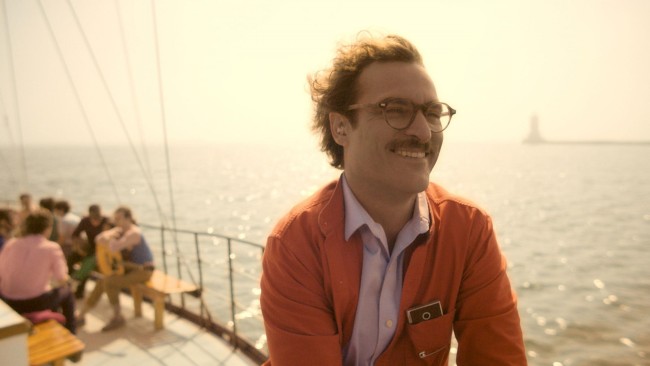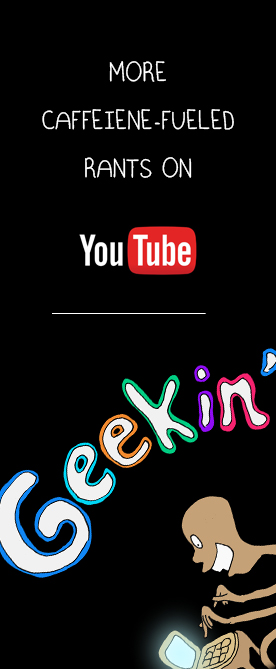By Mikhail Karadimov March 26th, 2014
Shortly after reading my review on Her, a friend of mine—who shall remain nameless—decided to sass my opinions with a rebuttal. Despite the inherent disrespect of such a move, I’m glad he did, for it got me thinking about aspects of the movie I failed to explore in my original review.
Here are my buddy’s thoughts:
I found your entire review interesting and thorough, though I’d like to add something to the mix. I think there was an equally large question of what constitutes a relationship? I believe Jonze made a poetic case for the truth of Theodore and Sam’s relationship. The pure definition of a relationship would be two or more objects, concepts, people, ‘things’ sharing a connection. In that sense, Theo and Sam had a connection. If someone were to claim that the relationship wasn’t true because Sam was an OS, it could be said that based upon her growth, she was as real as any human conscious, and our relationships are based upon our ability to consciously communicate (we could get into the metaphysical regarding what constitutes real, but that isn’t necessary. Right?). Can two immobile and blind hospital bed bound people, form a relationship only based upon their thoughts and words? Sam was able to form memories, emotions, understand, interpret and see the world with Theo. One could make the case that in being able to do so, she was more ‘real’ or ‘alive’ than the hospital patients. My dog, whom I love dearly, can’t communicate or relate to me anywhere as close as Sam did with Theo. Does that make my relationship with Tye any less meaningful? Are relationships shared emotions, experiences, feelings, thoughts, etc.? What do we value in our relationships? What makes the meaningful?
I think Jonze proposes an incredibly unique perspective on what it means to be ‘real’ and accept particular relationships. If Sam is considered to be real, and their relationships acceptable, how do we feel about that? Jonze conveniently freed us from the question by having Sam and all other OS’s leave the humans to interact with themselves—but what if they never left? What if the movie ended with Theo and Sam, growing equally together, and in love? How would we interpret the movie and the relationship?
And here’s my response:
I agree with you. To an extent. But I’m an old fashioned sort of dude and believe that romantic love is still something for just us humans. Love your dog, by all means, but I don’t think the love for your dog will ever be as strong as the potential love you have for another person—nor should it be. But who knows what the world has in store. Maybe by the time we’re able to interact with our OSs and bond with them in a romantic or friendly way, I’ll be the old coot with the anachronistic sentiments. Maybe I’ll be the ignorant old bastard pointing at the Bible and dictionary and pontificating, narrowly, on the laws of marriage. “Isn’t ANYthing sacred anymore!” Like the down-south assholes who still think interracial marriage is the devil’s brew for mischief.
As I mentioned in my review, I’m glad that Spike Jonze didn’t go the easy route and turn Sam and Theo’s love affair into a thing of over-the-top satirical delirium. I was afraid the film would turn gonzo like Being John Malkovich and Adaptation, two movies that insist on flying off the rails by the third act. And doubly happy that he had some kind of structure driving the story through its narrative beats, unlike Where the Wild Things, which was like watching the most beautiful fish flop around for two hours. What sometimes killed Her for me, and why it isn’t higher on my list, is the film’s tonal imbalance. There are points in the movie where I’m not a 100-percent sure if Jonze is as committed to the relationship as should be. Sometimes it plays sillier than it’s meant to, and then, at other times, it’s far too serious. It’s up to the audience really. It’s all about whether or not you’re able to give yourself over to the film’s central conceit, which is—once again—fucking ludicrous (from our 2014 perspective). I like to read the film more as a metaphor. That’s the only way I’m able to watch it with a serious eye. Because, to be honest with you, at no point was I totally invested in Sam and Theo’s relationship. I was more intrigued than anything else. I liked how Jonze treated the OSs as actual AI and explored the idea of what would actually happened if all these beings were floating about, without bodies, with the unlimited capacity of a human’s brain, soaking everything up. They would grow; they would evolve; they would become much greater than what they first started as. It’d be like watching a baby grow into a full-fledged adult overnight—their capacity for knowledge, at least. That’s very fascinating to me. But, as I mentioned, I prefer to read that as a metaphor for relationships and loneliness and the act of moving on, more than anything else. I think we’ve all been in relationships—be it romantic or not—where we felt as if we’ve outgrown the other person and moved on from them. It’s a painful realization, but it happens all the same. You try to combat the idea for the longest time, hoping that there’s still some semblance of those elements from before, and you lie and lie until finally coming to terms with it and admitting to yourself, “No, there’s nothing left here anymore. We were once good and whole, and now we are separate.” This is Theo’s ultimate journey. He married Catherine to avoid loneliness in a world where loneliness is the predominant form of malaise. As I think it is now, too. Theo was afraid of loneliness and so he packed all his bullshit onto this one girl for salvation. But that wasn’t enough, she had to also embody everything he wanted. She had to push aside her life to make room for his. That’s what so intrigued him about Samantha, her constant there-ness. She was in his pocket, for better or worse. He bought her as a piece of software. She was his to own. As he tried with Catherine. And he realizes this—as a slow burn epiphany—once Samantha’s gone. Samantha was a way-station more than anything else. A paper holder. With her there he avoided the bare truth of his white man plight. He tried so desperately to mold the world to his likeness, as we do with our facebook pages and app selections and playlists, as we do with all these world-spanning video games we play where you get to explore every facet of the sphere you inhabit (ie. Grand theft Auto and any and all RPGs). He wanted the world to function as he saw fit, for it to fall in line with his philosophies, his hurt, his love. But it doesn’t. It spins on without concern as to how you feel. And at the end, once he’s lost that control of love—or at least the illusion of control, the illusion of love—he’s able to come to terms with his pain and loneliness. For the longest time, it was impossible for Theo to accept his love interests as real entities functional outside his own realm of existence. That’s nothing new to the movie. That’s something that plenty of us are guilty of today. Nor is it unique to our era, I think it’s just more tangible with all the technological advances we’ve been dealing with of late. With all the distance we place between ourselves, it’s easy to create a phantom of a person out of someone’s facebook or e-harmony profile. Hell, we’re guilty of portraying ourselves unrealistically, too, idealizing ourselves. We edit the pictures we post, our likes and dislikes, how we interact over the message boards. We filter through a tight and perfection-obsessed lens. It’s terrible, the rigmarole we strain ourselves through. Perfection is the most bullshit concept we’ve ever created for the human vernacular. There’s no such thing, yet everyone chases after it with a rabbit-hole-like self scrutiny. It can drive a man mad, and lonely.
Whew.
Now, onto the question of WHAT IF—what if Samantha and the rest of the OSs never flew away into the great beyond of the cosmos to frolic around like the flower children of yesteryear in their great orgy of knowledge? Hmm. I think that’s a completely different movie, with a completely different message. I think then it becomes a fetishistic thing for Mr. Jonze: a tribute to the power of technology and the man’s need to conquer love and distill it down into a palm-sized gizmo. Finally, all the loving in the world! In the palm of your hand! Physical and conversational! Furthermore, I think it becomes an argument for just that. It strips the film of its metaphor and teaches us that, “Yes, indeed, you can control love from the remote accessibility of your breast pocket.” And then Theo goes on believing that love and people are something you can shift your way, manipulate and whip into shape like a lion tamer. It would defeat the film’s ultimate purpose. I wouldn’t have liked that movie. Not one bit.
Finally, people need other people for the simplest and most basic reason of all: sex. People need that contact. They need that flesh-on-flesh intimacy, that warmth, that sometimes-validation of, “Yeah, you’re alright.” A sexless life is a life of emotional atrophy. I think Theo would’ve eventually given in and slept with someone else anyway. That’s human nature. And no film has the right to defy the laws of human nature. Physics, yes. But never human nature.






